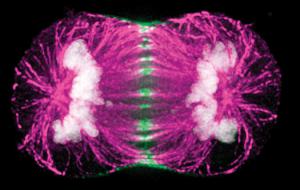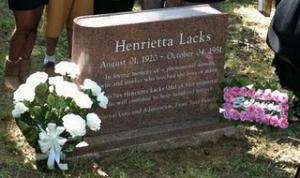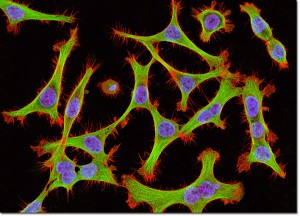Serendip is an independent site partnering with faculty at multiple colleges and universities around the world. Happy exploring!
Notes Towards Day 19 (T, Mar. 27): "a biography of both the cells and the woman they came from"

I. coursekeeping
Thursday: finish the text, and/or watch the
Law and Order episode, Immortal (accessing this?) -->
is VERY LOOSELY based on HeLa story; see Recap and review.
II. Sunday night reflections, going deep and wide:
leamirella (put up her notes): everything is "mediated"--and incomplete
froggies315: such constructions are true, but because individual,
not available for "collective revision"--is there a narrative middle ground,
between "absolutism" (a single correct story) and "relativistic bullshit"?
kobieta: if memory, reality, and dreams are all forms of perception =
constructions, how much overlaps from person to person?
KT (inspired again by kobieta): what’s important about the truth is its potential--
it provides certain expectations about outcomes; we can make decisions
based on predictable facts--so it's important to strive for
dglasser: FACTS = truths agreed upon by the majority of the relevant subject group,
but (contra Gaiman's dedication) there are multiple individual keys/paths to get there
cf. here History, Memory and the Brain and Part II:
Whence Nostalgia and the Constraints on Stories? -- which
talks about the construction of history as a 'collective revision'
Alicia noticed the way in which the photos "broke" her reading about Henrietta Lacks
EGrumer called that clustering "a genre convention" as well as a "poignant thread"
in the text: instances of remembering and forgetting, photographs lost and rediscovered
sterrab: took inspiration from Frances Kissling's claim there may not
always be common ground; she should have voiced her questions about
dreams as reality, and had "courage in disagreement"
vspaeth: putting pieces together/building a bridge: "you" is the key (to A Game
of You); in ILHL, we are again "looking for a key" (to a cure/understanding)
III. so, let's look! turning to the "biography of both
the cells and the woman they came from" (6).
 |
 |
Initial impressions: how did the book "operate" on you, on which
"structural" level? cellular, biographical, political? (give one telling detail--
Alicia, EGrumer on the photographs; who/what else?)
what about genre? (my angle of interest!)
Skloot, ix: "This is a work of nonfiction. No names have been changed,
no characters invented, no events fabricated....As one of Henrietta's
relatives said to me, 'If you pretty up how people spoke and change
the things they said, that's dishonest. It's taking away their lives,
their experiences, and their selves.'"
"We must not see any person as an abstraction. Instead, we must
see in every person a universe with its own secrets..."
(Elie Wiesel, from The Nazi Doctors and the Nuremberg Code)
"Everybody has a secret world inside of them...." (Neil Gaiman)
biologists teach us that the assemblies of cells that make up
living organisms, and ... the assemblies of living organisms
that make up the panoply of continually evolving life ... have
mechanisms that assure that local components take into
consideration the interests of both other local components
and the well-being of the larger assembly. When these fail,
one gets cancer, warfare, and widespread extinction.
Let's try reading this non-fictional prose work (about cancer)
as systems biologists, focusing on its complex interactions, emergent
properties.... using the (more "collectivist"?) methodology of biology
to read a literary text.
Is the language of the 3 parts of the book--"Life, Death, Immortality"--
individualistic or collectivist? humanistic or scientistic? where is
HeLa located? where is Henrietta's "self"?
I. Life
1: "the world's first immortal cells" (5: "go on dividing indefinitely")
3: "all it takes is one small mistake anywhere in the division process"
4: "any cell culture lab in the world ... we'd find ... billions of
Henrietta's cells... but no one knows anything about her"
7: I'd become a character in her story, and she in mine...
the Lackses challenged everything I thought I knew...
Deborah's voice: "she helpin lots of people...now we don't get a dime."
16: walking into Hopkins was like entering a foreign country
29: used patients from public wards for research without their knowledge
30: Gey "the world's most famous vulture, feeding on human specimens"
40-1: growing with mythological intensity... "spreading like crabgrass!"
48: "it just feels like that blackness be spreadin all inside me"
55: "You got my wife cells? She know you talking?...so let my old
lady cells talk to you and leave me alone"
58: referring to the cells as his "precious babies"
62: Tissue culture was the stuff of racism, creepy science fiction,
Nazis, and snake oil.
63: "benevolent deception"
80-1: "Everything about Henrietta dead except them cells...
Nobody round here never understood how
she dead and that thing still livin."
II. Death
90: her other organs were so covered in small white tumors
it looked as if someone had filled her with pearls.
91: "Oh jeez, she's a real person."
97: that HeLa was malignant just made it more useful.
118: "her cells done lived longer than her memory"
122: slave-owning white Lackses ... buried under their black kin ...
"spending eternity in the same place....They must've worked out
their problems by now!"
129: inmates "considered a vulnerable population unable to give
informed consent"
130: "To withhold emotionally disturbing but medically nonpertinent
details...is in the best tradition of responsible clinical practice"
131: the Nuremberg Code says, "The voluntary consent of the
human subject is absolutely essential." The idea was revolutionary.
132: should informed consent apply in cases ... where scientists
conduct research on tissues no longer attached to a person's body
134: "If the whole profession is doing it,
how can you call it 'unprofessional conduct'?"
154: "drop a turd in the punch bowl"--the HeLa contamination problem
159: "she was really just hospitality"
161: "her cells growin big as the world, cover round the whole earth...
just steady growin and growin, steady fightin off whatever they fightin off"
165: black oral history filled with tales of "night doctors" who
kidnapped black people for research...disturbing truths behind those stories.
168: "If our mother so important to science,
why can't we get health insurance?"
169: "You know what is a myth?...She didn't donate nothing.
They took them and didn't ask."
173: War on Cancer (vs. "War is a Bad Metaphor")



